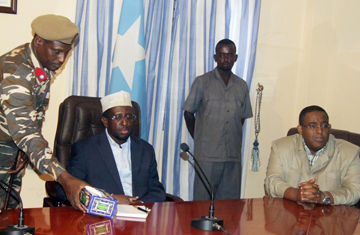
Somali president Sheik Sharif Sheik Ahmed, second left, sits with Somali prime minister Omar Abdirashid Sharmarke, right, during a news conference in Mogadishu's presidential palace, Somalia,Tuesday,Sept. 21,2010.
(2 of 2)
Al-Shabaab is clearly delighted with the rancor within the TFG. In an interview with TIME, group leader Sheikh Muktar Abdirahman Godane even went so far as to claim credit for the prime minister's resignation. "Indirectly, we as al-Shabaab do sometimes create those conflicts within the TFG," he said. "We don't want to see a unified government that can fight against us. It's part of our political operation."
So what happens next? The international community is bracing itself for the outright collapse of the TFG. Uganda's President Yoweri Museveni has recently started saying he wants the Ugandan peacekeeping contingent out of Somalia by January, a prospect that would be disastrous considering Ugandan troops make up about half of the African Union forces currently in Somalia.
Uganda's only other proposed solution has been to send 10,000 army reservists into Somalia, but only if it gets financial support from the U.S. Yet that scenario would likely just cause more chaos, since the reservists would not have nearly the same training as the Ugandan army's full-time soldiers.
The problem is that Somalia's government has a great trump card to help stave off international interference in its business: al-Qaeda. The U.S. believes that Islamic insurgents in the country have ties with al-Qaeda, and experts believe that the U.S. would rather keep the weak TFG in place rather than face the scenario of hardline Islamic insurgents taking control of the country.
That gives the TFG very little incentive to get its act together because the U.S. continues to back it — and probably will as long as it believes that keeping Somalia friendly could help contain al-Qaeda. Last year, U.S. Secretary of State Hillary Clinton appeared alongside Sharif in Nairobi and called his government "the best hope we've had in quite some time" for progress in Somalia.
On Tuesday, even after Sharmarke's dismissal, the U.S. seemed to indicate that little had changed. A State Department official says that the dispute between Sharif and Sharmarke "essentially paralyzed the Transitional Federal Government," was "counter-productive," and didn't "serve the best interests of the Somali people." Yet the official also reiterated that the U.S. government remains committed to "supporting Somalia's Transitional Federal Government to bring security and stability to all of Somalia."
Somali leaders could not have asked for a better endorsement, or a better indication that Washington is happy to let the TFG keep doing what it's doing.
"These mild statements of concern don't do the trick. [Somali's leaders] are people who need to be given a public dressing down," says Rashid Abdi, a Somalia analyst for the International Crisis Group. "This language that 'We don't have any other partner; we don't have any other option' — this is the language that inflated the TFG's ego."
Sharif's staff, for their part, insist they have nothing but their country's best interests in mind. "The cynics have their own way of questioning things," says spokesman Hashi. "But the president is positive. He thinks change is possible. If the will is there, I think there should be a way."
